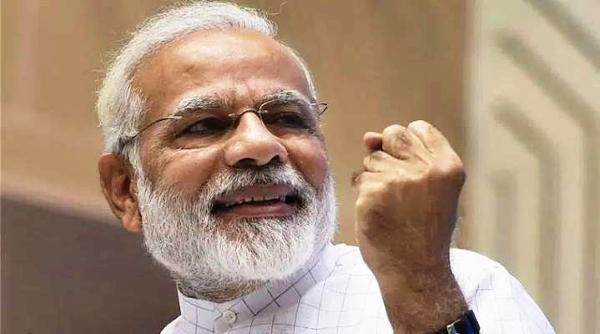The coronavirus disease pandemic (Covid-19) has offered India a valuable lesson on the importance of self-reliance and self-sufficiency, and the country, each state within it, each district within every state, and each village within every district must aspire to attain the twin goals, Prime Minister Narendra Modi said on Friday.
The PM also praised rural India for maintaining the norm of social distancing, and offered a simple, yet effective slogan to illustrate the concept — ‘do gaj deh ki doori’ (a distance of two yards) — which, he said, attested to the wisdom of the people in the countryside.
“This pandemic has thrown at us new challenges and problems which we have never imagined, but it also taught us a very good lesson with a strong message,” Modi said in an addressthrough video conferenceto India’s 250,000 gram panchayat heads on National Panchayati Raj Day.
“It has taught us that we have to be self-reliant and self-sufficient. It has taught us that we should not look for solutions outside the country. This is the biggest lesson we have learnt,” the prime minister said.
The address was delivered 10 days before India emerges from an extended 40-day lockdown ordered by PM Modi to stop the spread of Covid-19, which has taken a heavy toll on the economy with residents confined indoors, industrial production coming to a halt, air and rail services suspended and public transport going off the roads.Restrictions have been loosened selectively in some areas from April 20.
Global supply chains have been disrupted and all nations have become preoccupied with meeting their own challenges. Restrictions on travel and mobility have meant tight controls over the flow of goods, services and labour across international, state and district borders.
Modi emphasised that the development of the nation and democracy hinges on the progress made by the panchayats at the grassroots.
“Every village has to be self-sufficient enough to provide for its basic needs. Similarly every district has to be self-sufficient at its level, every state has to be self-reliant at its level and the whole country has to be self-reliant at its level,” he said.
“The international economic order is changing; the possibility of greater economic cooperation is diminishing. So the PM is emphasising the need to leverage India’s inner potential. There is also a larger message — wherein the PM is conveying to people they are equal partners in development,” Sanjay Kumar of the Centre for the Study of Developing Societies said.
Gram Panchayats are local, constitutionally empowered, political and administrative units of grassroots governance across villages in India. Panchayats are playing a key role in supporting the government’s outreach in vast belts of rural India to spread awareness about the coronavirus disease.
Panchayats have also undertaken door-to-door campaigns; stitched masks; made hand sanitisers for local populations; and provided support to the local administrative and security machinery in both providing basic services to residents and enforcing the lockdown.
With the rural population slowly going back to work — this is a busy time in the agricultural cycle and rural industries have been opened up in non-hot spot districts —securing public health throws up additional challenges.
Negligence by even a single individual can endanger whole villages, Modi said, warning against any sense of complacence. He asked panchayat heads to provide accurate information about the disease to each family in the villages, ensure that every individual downloads the Aarogya Setu app that tracks Covid-19 cases and takes care of the elderly, disabled, and the poor while maintaining social distancing.
The PM said that his government had worked to make panchayats stronger and villages self-reliant. “In the last five years, nearly 125,000 panchayats have been connected through broadband from a mere 100 before. Similarly, the number of Common Service Centres has crossed 300,000,” he said.
On Friday, the Prime Minister launched the e-Gram Swarajya app and the Swamitva Scheme. E-GramSwaraj is aimed at helping prepare and execute gram panchayat development plans; the Swamitva scheme is aimed at mapping inhabited rural lands, using drones and other latest survey methods.
“The scheme will ensure streamlined planning, revenue collection and provide clarity over property rights in rural areas. This will open up avenues for applying for loans from financial institutions by the owners. Disputes related to property would also be settled through the title deeds allotted through this scheme,” a government statement said.
Minister for rural development Narendra Singh Tomar was also present during the PM’s video conference with gram panchayat representatives on Friday.
Source: HT
Image Courtesy: MSN
You may also like
-
Navigating India’s Skill Landscape
-
Trade Connect E-platform For Exports Is Single Window, Fast, Accessible And Transformational: Shri Piyush Goyal
-
India-us Working Together In Areas Like Critical Minerals, Supply Chains And Advanced Technologies: Shri Piyush Goyal
-
Cabinet Approves Health Coverage to All Senior Citizens of the Age 70 Years and Above Irrespective of Income
-
Cabinet Approves PM Electric Drive Revolution in Innovative Vehicle Enhancement (PM E-DRIVE) Scheme With An Outlay of ₹.10,900 Crore
